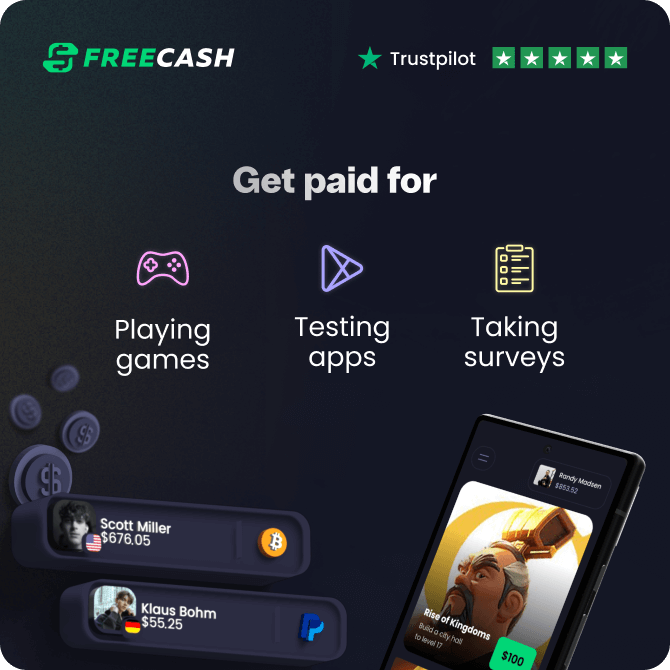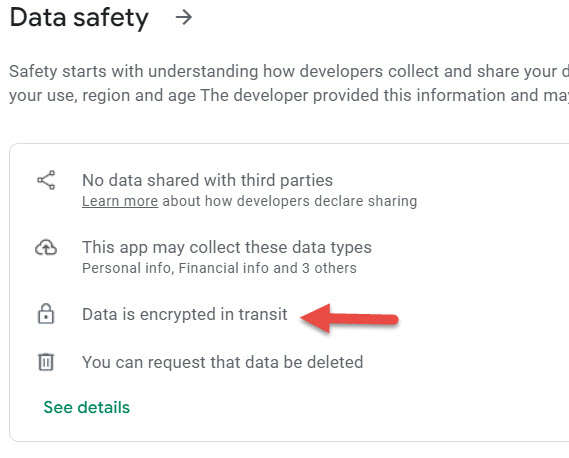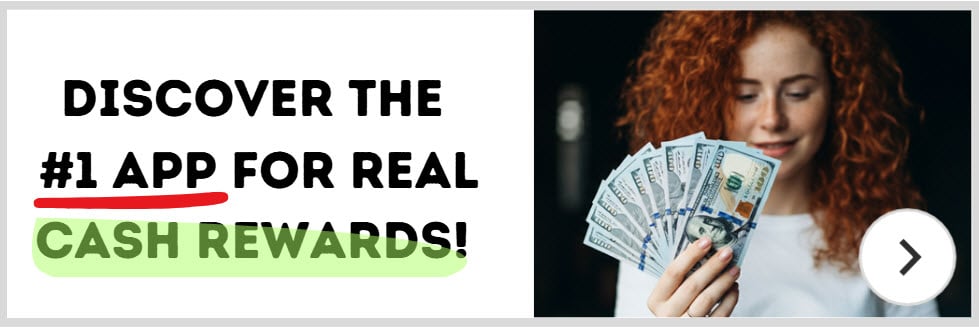Imagine this: It’s a lazy Sunday afternoon, and you’re casually scrolling through your smartphone.
An enticing ad pops up, promising quick cash or dazzling rewards.
You could be cashing in with just a few taps, maybe a survey or two. Tempting, isn’t it?
But here’s the catch: while you’re imagining the extra dollars in your bank account, cybercriminals are salivating at a different kind of treasure – your personal data.
Believe it or not, your smartphone holds a wealth of information about you.
From personal photos and contact lists to banking details and browsing history – it’s a digital diary of your life.
And in the wrong hands, this data can be weaponized against you in ways you haven’t even imagined.
Cybercriminals are becoming increasingly sophisticated, and they’ve identified these “money-making” apps as a prime avenue to exploit unsuspecting users.
Sure, you might think, “It’s just a harmless game,” or “There are many positive reviews”.
But the truth is, no one knows how these developers handle your information behind the scenes.
While an app might seem genuine on the surface, with plenty of shining testimonials, it doesn’t guarantee that your data is safe and sound.
And the stakes? They’re higher than you think.
Identity theft, financial fraud, and even potential blackmail.
The threats are real, diverse, and, unfortunately, on the rise.
So, before you dive into the next attractive app promising rewards or riches, it’s crucial to be armed with knowledge.
Knowledge that can protect you, your data, and your peace of mind.
In this post, we’ll explore the dangers posed by money-making apps and how to protect yourself.
Let’s dive deep and ensure that your data remains in the one place it should be – safely with you.
Money-Making Apps: A Quick Breakdown
Have you ever stumbled across an ad about an app that claims you can make money?
Well, you are not alone. I believe everyone with a smartphone has already stumbled upon one of these applications.
The world of “money-making” apps is vast, varied, and, let’s be honest, a bit bewildering.
These apps come in all shapes and sizes.

This reward platform is going viral! Cash out via PayPal, Visa, Gift Cards, and in-game currencies - Click here to find out how to generate an extra $10+ per day!
They have become popular due to their convenience, allowing users to earn from their smartphones or tablets. Here are the main types:
- Survey Apps: Users answer questions or provide feedback on products and services to earn rewards.
- Task Completion Apps: Earn money by completing simple tasks, which could include watching videos, completing offers, or trying out new apps.
- Cashback and Shopping Apps: Shop through these apps to receive a percentage of your purchase back or earn discounts.
- Game-Based Apps: Play games and earn rewards. Some promise insane cash rewards like thousands of dollars!
- Freelancing Apps: Platforms like Upwork or Fiverr where you offer your skills and services for a fee.
- Investment Apps: Apps like Etoro or Trading 212 where users can invest money and potentially see a return.
With a swipe here and a tap there, they suggest your phone can transform into a mobile ATM.
But, like most things in life, if it sounds too good to be true, it probably is.
That’s not to say that all these apps are out to get you.
There are legitimate ones out there that can provide a small income or gift cards.
However, the key is differentiating the good from the bad and understanding what you’re getting yourself into.
Why are there so many of these apps, you ask? Simple: Our attention and data are valuable.
Every ad you watch, or information you provide represents potential revenue for someone out there.
Why Your Personal Data is a Goldmine
In today’s digital era, personal data has become the new currency.
Just as gold miners once sifted through soil to uncover precious metals, companies and hackers now mine data to discover valuable insights.
But why is our personal data deemed so invaluable?
Firstly, personal data provides deep insights into individual behaviors, preferences, and lifestyles.
When businesses have access to this information, they can tailor their products, services, and advertising to specific target audiences.
This level of customization increases the chances of a sale, making marketing campaigns more effective and profitable.
Moreover, Big data can be analyzed using Artificial Intelligence to identify patterns and predict future behaviors.
For instance, by analyzing users’ purchasing habits and browsing history, companies can find what products people might be interested in.
However, the value of personal data isn’t limited to legitimate business uses.
There’s a darker side too!
Hackers and cybercriminals recognize the worth of personal information.
Therefore, they target databases to steal identities, commit fraud, or sell the data on the black market.
Furthermore, data brokers operate in a largely unregulated environment, gathering vast amounts of information and selling it to the highest bidder.
They can sell your data to companies wanting to refine their marketing strategies or entities with nefarious intentions.
It’s also worth noting that, in some cases, individuals might unwittingly give away their data.
Free reward apps and mobile games might seem harmless, but they can hide sinister intentions.
Many lure users with the promise of easy money only to siphon off valuable personal information.
This data can then be sold to third parties, used in marketing schemes, or even leveraged for identity theft.
Common Data Risks in Reward Apps
Reward apps have become increasingly popular as they give users incentives for feedback or participation in various tasks.
However, like any other online platform, they come with data risks.
Firstly, there’s the risk of data breaches.
With the massive amount of user information stored, these apps can be prime targets for hackers.
Once a breach occurs, sensitive information like names, addresses, and even financial details can be exposed.
Additionally, many users unknowingly provide excessive personal data.
It’s not uncommon for survey apps to ask questions that might seem harmless, but when pieced together, they can give a detailed user profile.
This information can be exploited for targeted advertising or even more malicious purposes.
Moreover, data mismanagement by the app companies is another concern.
Sometimes, these companies may not follow best practices in storing or securing data, leading to accidental leaks.
This can also occur when data is shared with third-party vendors without proper oversight.
Furthermore, some apps might not be transparent about using the collected data.
Despite agreeing to privacy policies, users may be unaware that their information is being sold or shared.
The Deep Scars of Data Intrusions
When someone’s data is exposed, the implications can be severe and far-reaching.
One of the most immediate risks is data theft. Here, cybercriminals might gain unauthorized access to personal information, such as names, addresses, and even social security numbers.
With this data in hand, criminals can potentially commit identity fraud, where they assume another person’s identity to carry out illicit activities.
This can include opening bank accounts, securing loans, or making unauthorized transactions, all under the victim’s name.
Moreover, criminals can sell stolen data on the dark web.
The dark web is a part of the internet that isn’t indexed by search engines and is notorious for hosting illegal activities.
Here, personal data is traded like commodities; anyone willing to pay can purchase this information for their own ends.
This can lead to many crimes, ranging from financial fraud to more sinister acts like blackmail or harassment.
Beyond the immediate financial implications, there are also emotional and psychological effects.
Victims of data breaches often feel violated and suffer from a sense of insecurity, not knowing where their information might end up or how it will be used.
This can lead to anxiety, sleepless nights, and constant fear of being watched or monitored.
Furthermore, rectifying the damage can be time-consuming and costly.
Victims might need to change passwords, close accounts, or even hire professionals.
Lastly, there’s also the issue of reputation damage.
For instance, if someone’s private photos or messages are exposed, it can harm their personal and professional reputation.
In a digital age where information travels fast, reclaiming your privacy is almost impossible.
No Encryption, No Safety
Imagine you’re sending a secret message in a bottle across a river.
Your secret is compromised if anyone intercepts that bottle and reads the message.
But what if you wrote that message in a unique code, and only the intended recipient knew how to decipher it?
This is the basic idea behind data encryption, and it’s a vital tool in safeguarding our personal information.
In the context of apps, data encryption is like turning the information you share—whether that’s messages, photos, or payment details—into a complex puzzle.
Only someone with the right ‘key’ can solve that puzzle and see the original information.
Sadly, many apps do not use this protective measure.
This means the data you provide to those apps is like an open book, easily readable by anyone who gains access.
This is particularly concerning when we consider how much sensitive information we share with these apps.
Encryption is crucial because it ensures that even if hackers intercept your data, they can’t understand it without the decryption key.
It’s like stealing a locked treasure chest without having the key to open it.
The contents remain safe and secure.
Therefore, if you value your data, you should avoid apps that don’t use encryption.
You can check whether an Android app encrypts data by reading the data safety section on the Play Store.
Here is an example:

The Dangers of Fake Cash Games
It’s a tempting prospect: playing a fun, free mobile game and earning real money.
But as the saying goes, if it sounds too good to be true, it probably is.
Fake cash games have become an internet sensation, exploiting the allure of quick, easy cash.
But there’s a dark side to these games that many players are unaware of, which involves the safety of their personal information.
Most of these games originate from overseas, beyond the reach of stringent data regulations in Europe, North America, and Oceania.
Operating in such grey areas, these developers can act without fearing repercussions, primarily because they have no local reputation at stake.
Their goal? To harvest as much user data as they can, by any means possible.
The gameplay is simple: players earn virtual cash, which they’re told can be converted into real money once they accumulate a specific amount, often as high as $300 or even $1000.
The catch? The payout never happens. But before realizing this, many players have already shared their email addresses, phone numbers, or even more sensitive details in hopes of getting their ‘winnings.’
This is where the real danger lurks. Many of these apps lack data encryption.
Besides, the data users voluntarily provide to cash out can be a gold mine for data thieves!
With no encryption, any data inputted can easily be accessed and then misused or sold.
There’s a rising concern that this data finds its way to the dark web, a haven for cybercriminals.
Some users, lured by the promise of cash rewards, may even provide bank details or passwords.
Alarmingly, they don’t realize they’re handing potential thieves the keys to their finances.
This unchecked behavior poses a significant risk.
Players might be chasing virtual dollars, but they could end up in big trouble!
How to Minimize The Risks?
There is no guarantee that user data will always be protected and respected, but there are steps that you can take to minimize the risks.
Here’s a simple guide on best practices to ensure your data’s safety when using mobile apps.
Conclusion
The temptation to make some extra cash from our smartphones is undeniable.
They promise easy gains, fun experiences, and sometimes a bit of pocket change.
Yet, beneath the sheen of these tempting offers lie potential pitfalls that can cost us far more than we might earn.
Our personal data — the intimate diary of our digital lives — can become a treasure trove for unscrupulous developers.
Every tap, permission granted, and shared information is a piece of ourselves that we put out there.
Therefore, it’s essential to approach reward apps with caution.
Take a step back, do your research, and always prioritize your online safety.
Final Words
Thank you for taking the time to journey through this important topic with me.
Do you have any questions, concerns, or personal experiences related to the data security of reward apps?
Or perhaps some insights or tips to share? If so, please feel free to drop a comment below!
Peace!


